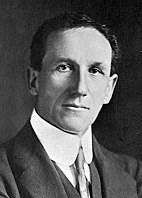1917 New South Wales state election
| ||||||||||||||||||||||||||||||||||
All 90 seats in the New South Wales Legislative Assembly 46 Assembly seats were needed for a majority | ||||||||||||||||||||||||||||||||||
|---|---|---|---|---|---|---|---|---|---|---|---|---|---|---|---|---|---|---|---|---|---|---|---|---|---|---|---|---|---|---|---|---|---|---|
| ||||||||||||||||||||||||||||||||||
 Legislative Assembly after the election | ||||||||||||||||||||||||||||||||||
| ||||||||||||||||||||||||||||||||||
The 1917 New South Wales state election was held on 24 March 1917. This election was for all of the 90 seats in the 24th New South Wales Legislative Assembly and it was conducted in single-member constituencies with a second ballot if a majority was not achieved on the first. The 23rd parliament of New South Wales was dissolved on 21 February 1917 by the governor, Sir Gerald Strickland, on the advice of the premier William Holman.[1][2][3]
Since the previous election, Premier Holman had left the Labor Party with 17 of his supporters and entered into a coalition with the opposition Liberal Party, as a result of the 1916 conscription dispute that split the Labor Party nationally. In early 1917, Holman's supporters merged with the Liberals to form the New South Wales branch of the Nationalist Party. Although the merged party was dominated by former Liberals, Holman became its leader, and thus remained premier.
The Nationalists won a sweeping victory, scoring a 13-seat swing which was magnified by the large number of former Labor MPs who followed Holman out of the party. It thus presaged the federal Nationalists' equally comprehensive victory in the federal election two months later.
Key dates
[edit]| Date | Event |
|---|---|
| 21 February 1917 | The Legislative Assembly was dissolved, and writs were issued by the governor to proceed with an election. |
| 3 March 1917 | Nominations for candidates for the election closed at noon. |
| 24 March 1917 | Polling day. |
| 17 April 1917 | Opening of 24th Parliament. |
Results
[edit]|
1917 New South Wales state election [1][4] | ||||||
|---|---|---|---|---|---|---|
| Enrolled voters | 1,109,830 | |||||
| Votes cast | 616,146 | Turnout | 61.43 | -6.81 | ||
| Informal votes | 6,332 | Informal | 1.02 | –1.28 | ||
| Summary of votes by party | ||||||
| Party | Primary votes | % | Swing | Seats | Change | |
| Nationalist [a] | 292,306 | 47.44 | +1.17 | 52 | +13 | |
| Labor | 262,655 | 42.63 | −4.00 | 33 | −16 | |
| Independent | 25,528 | 4.14 | +1.86 | 3 | +2 | |
| Independent Labor | 20,085 | 3.26 | +1.88 | 1 | 0 | |
| Ind. Nationalist | 15,201 | 2.47 | +0.03 | 1 | +1 | |
| Ind. Socialist Labor | 371 | 0.06 | –0.19 | 0 | 0 | |
| Total | 616,146 | 90 | ||||
Retiring members
[edit]Labor
[edit]- Ernest Durack MLA (Bathurst)
Nationalist
[edit]- Henry Hoyle MLA (Surry Hills) — elected as Labor
- James Mercer (Rozelle) — elected as Labor
- Charles Wade MLA (Gordon)
See also
[edit]- Candidates of the 1917 New South Wales state election
- Members of the New South Wales Legislative Assembly, 1917–1920
Notes
[edit]- ^ Compared to the combined vote of Liberal Reform, Farmers and Settlers and Country Party Association at the 1913 election.
References
[edit]- ^ a b Green, Antony. "1917 election totals". New South Wales Election Results 1856-2007. Parliament of New South Wales. Retrieved 13 March 2020.
- ^ "Part 5B alphabetical list of all electorates and Members since 1856" (PDF). NSW Parliamentary Record. Parliament of New South Wales. Retrieved 20 April 2020.
- ^ "Former members of the New South Wales Parliament, 1856–2006". New South Wales Parliament. Retrieved 4 December 2019.
- ^ Hughes, Colin A. (1975). Voting for the New South Wales Legislative Assembly, 1890-1964. Dept. of Political Science, Research School of Social Sciences, Australian National University. ISBN 0708103057.


